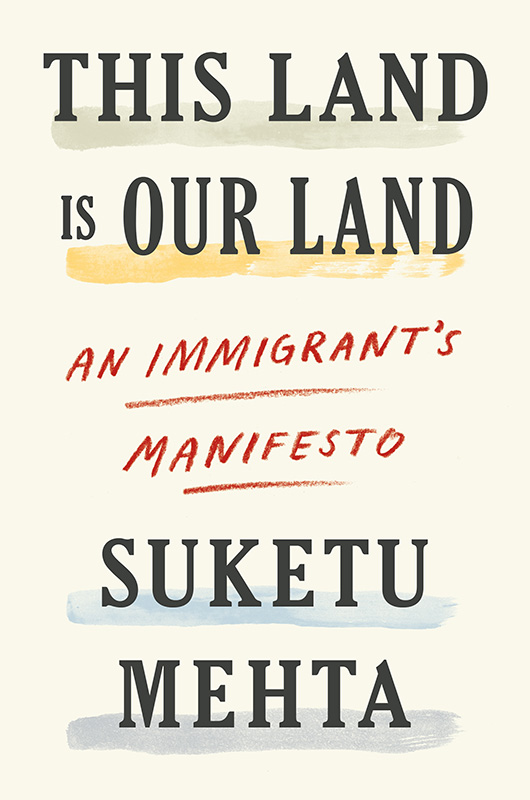Numbers are naturally uncertain on the point, but it’s estimated that in the present day roughly 250 million people are living in countries where they were not born. Millions and perhaps hundreds of millions more, surrounded by war, disease, poverty and oppression, yearn to emigrate but lack the money or the opportunity. As Suketu Mehta puts it in his stern but hopeful new book This Land is Our Land: An Immigrant’s Manifesto, “We’ve become a planet on the move.”
Mr. Mehta himself is part of this larger phenomenon—he and his family emigrated from India to New York in 1977. He’s been an American citizen for decades, and his book has an extremely foreseeable origin-point: the election of Donald Trump to the White House in 2016, when, as Mr. Mehta writes, “The white racists who had been hiding under rocks since the 1960s slithered out after Trump’s victory and joined his battle.”
That battle is by now dolefully familiar, both to Americans and to the broader, appalled world. The “world on the move” Mr. Mehta mentions is not a distant phenomenon Americans can comfortably watch on news programs. It’s America’s problem as much as it is everybody else’s.
“This is changing elections, culture, cities—everything,” Mr. Mehta writes. “Mass migration is the defining human phenomenon of the twenty-first century.”
This Land is Our Land describes itself as a manifesto, but its intellectual depth and panoramic sweep raise it far beyond some kind of angry doctrinal screed. Mr. Mehta, a journalism professor at New York University and author of 2004’s Maximum City: Bombay Lost and Found, looks at every aspect of the immigrant crisis, and throughout the book he grounds the larger picture in specific, humanizing portraits of people who find themselves strangers in strange lands.
“The first thing that a new immigrant sends to his family back home isn’t money; it’s a story,” he points out, and his own book is filled with such stories.
He describes, for instance, the plight of 26-year-old Khalil, who made the long trek from Guinea to Spain with his family in hopes of a better life, traveling across Africa with 16 other migrants, little food and almost no water, driven the whole time by the dream of a new home: “They know it’s dangerous, they know they might die making the crossing; but when you’ve come this far, when you’ve crossed deserts and mountains, this is the final bit,” Mr. Mehta writes of their journey’s final leg. “Because you can see Spain, you can see your destination.”
Despite his book’s very American starting point—an American presidential candidate descending an escalator in New York city, opening his mouth, and uttering comments bigoted enough to get him summarily fired from any job in the country—Mr. Mehta presents his readers with a broad international portrait of the immigration tidal wave now battering most of the world. He writes about Indonesia, Africa and “the orderly nations of northern Europe,” nations hostile to the economic migrant because “he is the sum of their worst fears, the looming future of the twenty-first century brought in human form to their borders.”
And Mr. Mehta is far from the first writer to note that the problem is going to get much, much worse, and to note the main reason why. Climate change, he writes, is a “threat multiplier,” making an already-bad problem incalculably worse. Between 2008 and 2014, 184 million people emigrated from their homelands because of catastrophic climate change in the form of record-breaking floods and storms and droughts.
“With continued climate change, this number is set to rise dramatically,” Mr. Mehta writes. “For each meter of sea level rise, 150 million people will have to flee their homes.”
By mid-century, migration will account for 72 per cent of the population growth in the USA—and as high as 78 per cent in Australia and the UK. As parts of the Earth’s surface become steadily less habitable, their occupants will move. The reality of it is as unavoidable as a landslide.
Does This Land is Our Land offer any hope in the face of such forces? Mr. Mehta clearly wants it to. He cites polling that finds Americans among the most welcoming people on Earth, among the most likely to say that an immigrant can also be a “real American.”
He states again the facts that compassionate Americans have been stating and re-stating since 2016: that America is a nation of immigrants, and that immigration makes the country stronger.
It’s all true, even if it seems like thin comfort in the face of 2019’s relentlessly stark headlines. But then, hope is always a slender thing.
On Saturday, August 3 at 3 p.m., Suketu Mehta will take part in a panel called The Future of Life on Earth: Migration, Immigration and Climate Change. On Sunday, August 4 at 10:40 a.m., he will participate in a discussion with Indira Ganesan.








Comments
Comment policy »